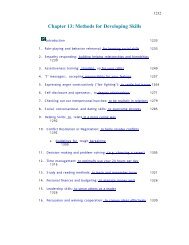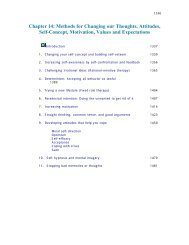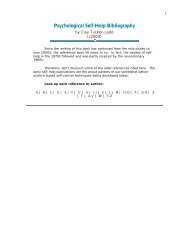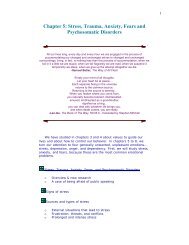Chapter 3: Values and Morals:Guidelines for living - Psychological ...
Chapter 3: Values and Morals:Guidelines for living - Psychological ...
Chapter 3: Values and Morals:Guidelines for living - Psychological ...
Create successful ePaper yourself
Turn your PDF publications into a flip-book with our unique Google optimized e-Paper software.
sacred ground reserved exclusively <strong>for</strong> "persons of the cloth" <strong>and</strong> God.<br />
The place inside where we store our values <strong>and</strong> our conscience is a<br />
scary place to which we invite few people, resenting those who intrude<br />
<strong>and</strong> question our values or preach to us. Perhaps, values are a touchy<br />
topic because our own guilty conscience, when aroused, can hurt us. It<br />
is true that many people loosely "expect" their religion to keep them<br />
moral, but, on the other h<strong>and</strong>, insist that religion shouldn't get too<br />
deeply involved in their "private" behavior or challenge their<br />
rationalizations <strong>for</strong> selfish, immoral behavior. Most importantly, I think<br />
we avoid discussing our values because we are unsure of them <strong>and</strong><br />
afraid our self-serving denials <strong>and</strong> illusions will be revealed by an open<br />
airing of our beliefs.<br />
From my teaching, I have an illustration of how the human mind<br />
protects its beliefs: I have indicated many times in many ways to my<br />
students that I have doubts about God. Although thous<strong>and</strong>s have<br />
come to ask me about other concerns, not one student has ever<br />
approached me to find out more about my reasons <strong>for</strong> doubting God or<br />
my explanation of peoples' beliefs in God. Quite a few have come to<br />
"save" me, but they only wanted to talk, not listen. When was the last<br />
time you heard of a church inviting an atheist or agnostic to join them<br />
in discussing the existence of God? We maintain many of our beliefs by<br />
avoiding questions <strong>and</strong> doubts, by closing our minds. Perhaps closedmindedness<br />
is a good coping mechanism in terms of religious beliefs,<br />
but I doubt if a locked mind is the best processor of ideas to guide our<br />
lives. It is hard to even help yourself, if you have a mind that is afraid<br />
to think.<br />
A leading researcher of values, Milton Rokeach (1973), believes<br />
that it is often necessary to become dissatisfied with yourself be<strong>for</strong>e<br />
you will change your behavior, attitudes, or values. That makes sense,<br />
but it means one has to (a) create a problem (self-dissatisfaction) in<br />
order to (b) solve a problem of morals (e.g. becoming more<br />
considerate). Naturally, we will be tempted to take the easy way out<br />
<strong>and</strong> avoid dealing with both "problems," but this chapter will try to<br />
stimulate <strong>and</strong> confront our thinking in such a way that each of us can<br />
arrive at a consistent, meaningful, just, <strong>and</strong> motivating set of values to<br />
live by, day by day. If we are successful, however, each of us will<br />
surely feel some uneasiness during the process of clarifying our<br />
values. That is to be expected.<br />
As you know, there is a bewildering assortment of values thrust<br />
upon each of us, e.g. by family, religion, teachers, friends, ads, media,<br />
movies, music, etc. And, many people <strong>and</strong> groups take their beliefs<br />
<strong>and</strong> values very seriously. They are certain they are right. If you reject<br />
their beliefs, you may encounter serious, real threats, e.g. "you'll burn<br />
in hell" or "get out of my house" or "you'll never be happy" or "how<br />
can you look yourself in the mirror?" or "that will end our relationship."<br />
This is playing hard ball. Sometimes, especially when the other<br />
person's values <strong>and</strong> purposes have not been clearly revealed to you<br />
early in the relationship, their moral judgments, rejection, <strong>and</strong> threats<br />
can be very powerful. I will not deceive you about my beliefs nor will<br />
7












